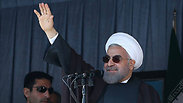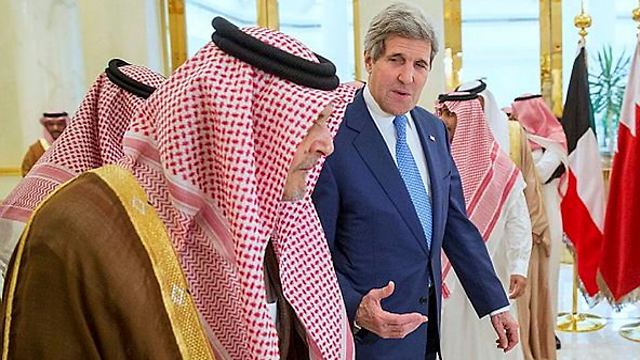
The enemy of my enemy is still my enemy
Analysis: Despite their anxiety at the prospect of a nuclear Iran, the Gulf states are still hostile toward Israel - and the next Israeli government will have to find a way to change that.
What is stopping the Arab world from understanding that Israel is a viable ally against a common enemy - Iran?
The fear index in the Arab world – mainly in the Gulf States – is on the rise. The current deal emerging between the Ayatollahs' regime and the US could turn Iran into the greatest power of the Muslim world within a few years.
Freed of sanctions, Iran could use its natural resources for a significant military buildup. The ability to oversee Iran’s nuclear facilities is limited given the country’s sheer size and the regime’s unwillingness to cooperate with the UN inspectors. Right now, Iran is waiting impatiently for sanctions to be lifted so that foreign currency can resume its flow into the state coffers.

Moscow, too, is waiting impatiently for sanctions to be lifted, so as to hurry along the (covert) development of Iran's nuclear weapons in exchange for capital that would ease Russia economic crisis. Although they will never admit it, many in the Arab world undoubtedly identified with Prime Minister Benjamin Netanyahu’s Congress speech last Tuesday. Can a mutual enemy create an alliance between Israel and the Arab world?
A silent agreement
In his speech, Netanyahu warned the US not to make a mistake. The fact that Iran is fighting against the Islamic State does not make it America's friend. Only last week it destroyed a mock US aircraft carrier during naval drills near the Strait of Hormuz, despite being engaged in amicable negotiations with P5+1 representatives in Geneva.Although President Hassan Rouhani’s regime is considered “moderate,” “Death to the US” is still chanted on the streets of Iran. But Washington does not seem to get it.
Iran is taking advantage of the war against IS and the nuclear talks in order to deepen and consolidate its hold over the countries of the Middle East. Historians can compare this process to the way Soviet leader Joseph Stalin took advantage of the war against the Nazis in order to take over Eastern Europe.
Related articles:
- Netanyahu to Congress: Current deal will all but guarantee nuclear Iran
- Tacit Saudi support for Netanyahu's Congress speech on Iran
- Fearing Iran, Gulf Arab states close ranks with joint navy, police
In a post-IS Middle East, Iran could find itself with four protectorates. According to Arab media the Iranian Revolutionary Guards are present everywhere across the Middle East: In Syria they are using the war against IS in order to strengthen President Bashar Assad’s regime in the west.
In south Syria, near the Golan Heights, Iran is trying to strengthen Hezbollah and open a front against Israel. In Iraq, the Guards are using the US-led coalition air strikes on IS targets in order to help Shiite militias control vast parts of the country. In Yemen, the civil war is helping Iran support the Shiite Huthis in their quest to take over the entire country.
Most Arab commentators have quoted or justified Netanyahu’s warning that "Iran is now in control of all four states – Yemen, Iraq, Syria and Lebanon, with the latter being a stronghold of Iran over the past 20 years, courtesy of Hezbollah."
Israel is more dangerous
The Arab commentators, even of the anti-Iranian Saudi newspapers, appear intent on reminding the Arab world: the enemy of your enemy is not your friend. Saudi commentator Badar al-Rashad recently wrote an article on the front page of Al-Hayat entitled “Iran and Israel – is my enemy’s enemy my friend?” Al-Rashad claims many in the Gulf states think Iran is a bigger danger to the Arab world than Israel, therefore there can be no escape from normalizing the relationship with Israel. Al-Rashad claims he personally does not agree with this assessment but “many others think it makes a lot of sense.”
It is important to mention that in the Arab world in general, and in the Saudi one in particular, one cannot write an article opposed to the regime’s stand. Al-Rashad claims that Israel is a much bigger threat than Iran. He explains that Iran threatens the Arab world, but Israel was established on Arab land and keeps expanding over more. He also says that although Iran has expansionist aspirations, Israel’s policy is much more aggressive (taking over Sinai in 1973 and invading of Lebanon of 1982).

Israel has remained an aggressive and violent state, he continues, made clear by its bombing of Lebanon and Syria. He adds that, "Iran might support those who kill Arabs, but Israel kills them." He also says that the world is shocked by the possibility of Iran having nuclear weapons, however "Israel has had them for decades."
Al-Rashad reminds his readers that in 1981, Israel bombed Iraq’s nuclear facility and accuses the US of invading Iraq only for the purpose of serving Israel’s security needs. According to al-Bashar, Israel is more dangerous than Iran also because it attracts Jews from all over the world, thus enhancing its power.
The Saudi commentator concludes that the conflict with Iran is solvable because Arabs and Persians have lived together for centuries in the Islamic world, whereas “the Zionist entity does not belong in the region.”
Iran – an excuse not to make peace
In another article in the Saudi Al-Arabiya, journalist Ali Nun of the Lebanese daily Al-Mustaqbal claims that the Iranian threat enables “the greatest terrorist in the world to address Congress.” According to Nun, Netanyahu is not lying when he says that Iran now controls four states and has nuclear weaponry aspirations - but this is only an excuse to avoid talking about the Israeli-Palestinian peace process and the bombing of "Iran’s friends" in Gaza (Hamas).Saudi journalist Daoud Al-Sharian hints in his Al-Arabiya editorial that Netanyahu’s speech was an illusion, and that Iran and Israel have been cooperating against the Arabs since the days of the Shah. He claims that the US is interested in achieving a balance between the future Shiite Iranian nuclear arsenal and the Sunni Pakistani nuclear arsenal. In exchange, Iran is aiding the US in the war against IS in Iraq and Syria. According to Al-Sharian, Iran has never helped the Palestinian people in any way.
Al-Hayat journalist Walid Shakir mused that the US is seeking a dialogue between its new ally Iran and its old ally Israel. Kuwaiti commentator Mohammed al-Ramihi justified Netanyahu’s speech and stated that for Iran, a deal at the end of March would be considered a victory over the “great Satan” (the US), as Iran would then be able to take over whole parts of the Arab world, and develop a nuclear weapon.
The grim conclusion from these articles is that the Iranian threat did nothing to change the Arab world’s stand towards Israel. It still considers Israel an enemy, not an ally, in the fight against Iran. Israel is seen as the third side of a triangle that threatens the Arab world – along with Iran and Turkey.
Israel’s new government will have to find a way to dialogue with those Arab states threatened by Iran, despite their hatred and suspicion. Egypt and Jordan can surely help in that task.










